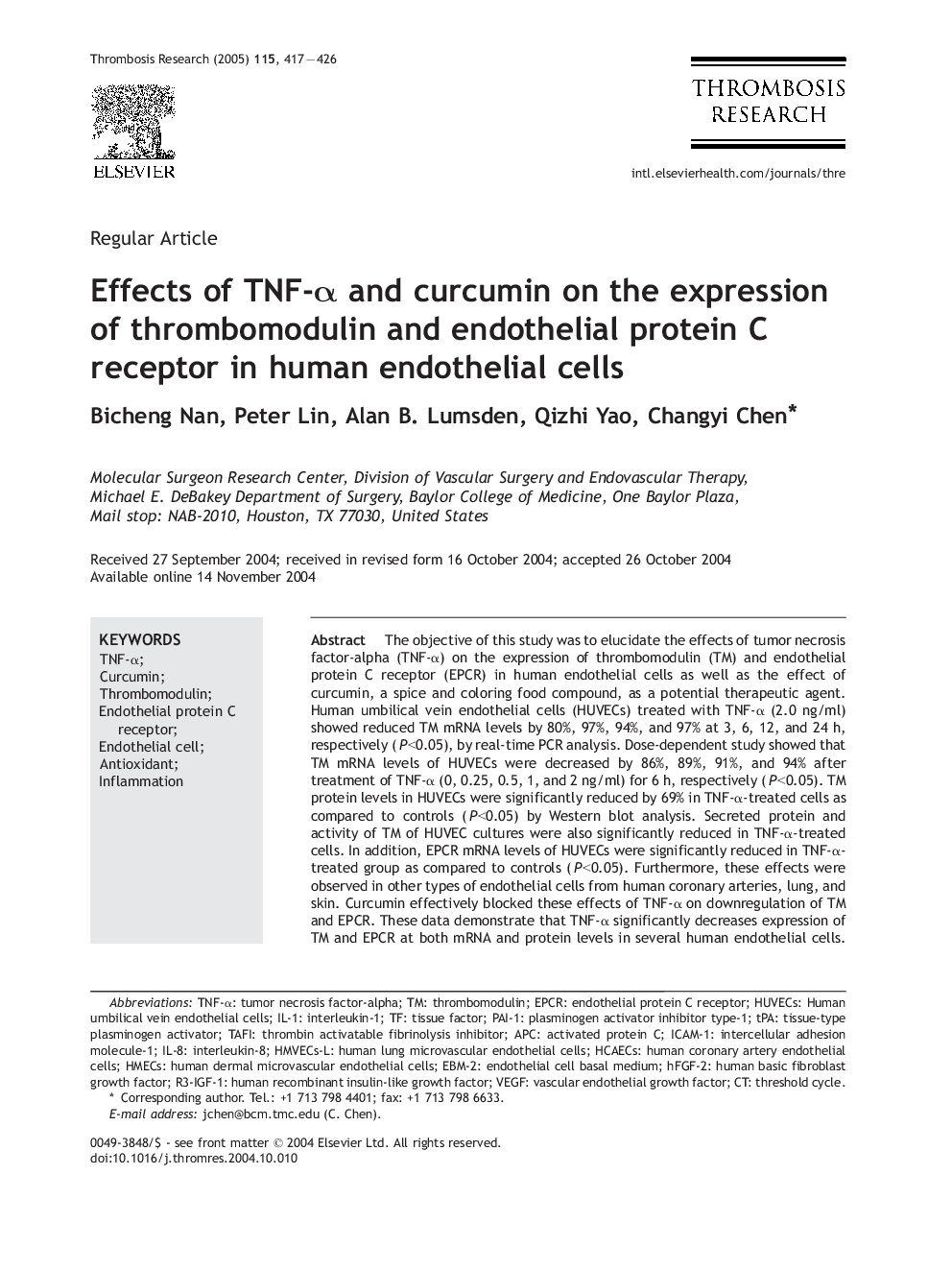| Article ID | Journal | Published Year | Pages | File Type |
|---|---|---|---|---|
| 9185024 | Thrombosis Research | 2005 | 10 Pages |
Abstract
The objective of this study was to elucidate the effects of tumor necrosis factor-alpha (TNF-α) on the expression of thrombomodulin (TM) and endothelial protein C receptor (EPCR) in human endothelial cells as well as the effect of curcumin, a spice and coloring food compound, as a potential therapeutic agent. Human umbilical vein endothelial cells (HUVECs) treated with TNF-α (2.0 ng/ml) showed reduced TM mRNA levels by 80%, 97%, 94%, and 97% at 3, 6, 12, and 24 h, respectively (P<0.05), by real-time PCR analysis. Dose-dependent study showed that TM mRNA levels of HUVECs were decreased by 86%, 89%, 91%, and 94% after treatment of TNF-α (0, 0.25, 0.5, 1, and 2 ng/ml) for 6 h, respectively (P<0.05). TM protein levels in HUVECs were significantly reduced by 69% in TNF-α-treated cells as compared to controls (P<0.05) by Western blot analysis. Secreted protein and activity of TM of HUVEC cultures were also significantly reduced in TNF-α-treated cells. In addition, EPCR mRNA levels of HUVECs were significantly reduced in TNF-α-treated group as compared to controls (P<0.05). Furthermore, these effects were observed in other types of endothelial cells from human coronary arteries, lung, and skin. Curcumin effectively blocked these effects of TNF-α on downregulation of TM and EPCR. These data demonstrate that TNF-α significantly decreases expression of TM and EPCR at both mRNA and protein levels in several human endothelial cells. Curcumin can effectively block TNF-α-induced endothelial dysfunction. This study suggests a new molecular mechanism of inflammation-induced thrombosis and a new therapeutic strategy to prevent this clinical problem.
Keywords
tPAEPCRIL-8APCTAFIEBM-2ICAM-1HUVECSPAI-1HMECsHCAECsIL-1AntioxidantinflammationInterleukin-8interleukin-1Thrombomodulintumor necrosis factor-alphahuman coronary artery endothelial cellsEndothelial cellHuman umbilical vein endothelial cellshuman dermal microvascular endothelial cellsHuman lung microvascular endothelial cellsTissue factorVascular endothelial growth factorVascular Endothelial Growth Factor (VEGF)Human basic fibroblast growth factorTNF-αTissue-type plasminogen activatorendothelial cell basal mediumThrombin activatable fibrinolysis inhibitorintercellular adhesion molecule-1Activated protein Cplasminogen activator inhibitor type-1threshold cycleCurcuminendothelial protein C receptor
Related Topics
Health Sciences
Medicine and Dentistry
Cardiology and Cardiovascular Medicine
Authors
Bicheng Nan, Peter Lin, Alan B. Lumsden, Qizhi Yao, Changyi Chen,
